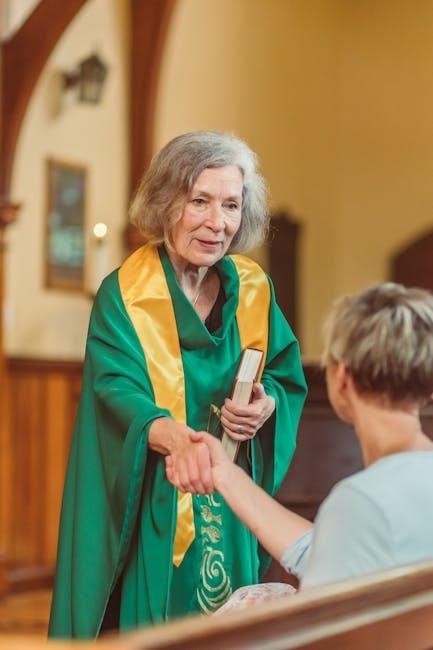
Church elders are spiritual leaders entrusted with guiding and overseeing local congregations‚ ensuring biblical principles are upheld in governance‚ teaching‚ and fellowship. Their role is vital for maintaining unity‚ providing spiritual guidance‚ and equipping believers for ministry‚ reflecting the New Testament model of eldership.
Overview of Church Elders and Their Role
Church elders are ordained leaders responsible for guiding and overseeing the spiritual well-being of the congregation. Their primary role includes teaching‚ providing spiritual guidance‚ and ensuring the church adheres to biblical principles. Elders work alongside deacons to maintain order and facilitate ministries‚ focusing on prayer‚ preaching‚ and doctrine. They are also involved in decision-making processes‚ ensuring unity and fostering a healthy church environment. Elders serve as examples of faith and integrity‚ playing a crucial role in equipping believers for ministry and strengthening the church community.
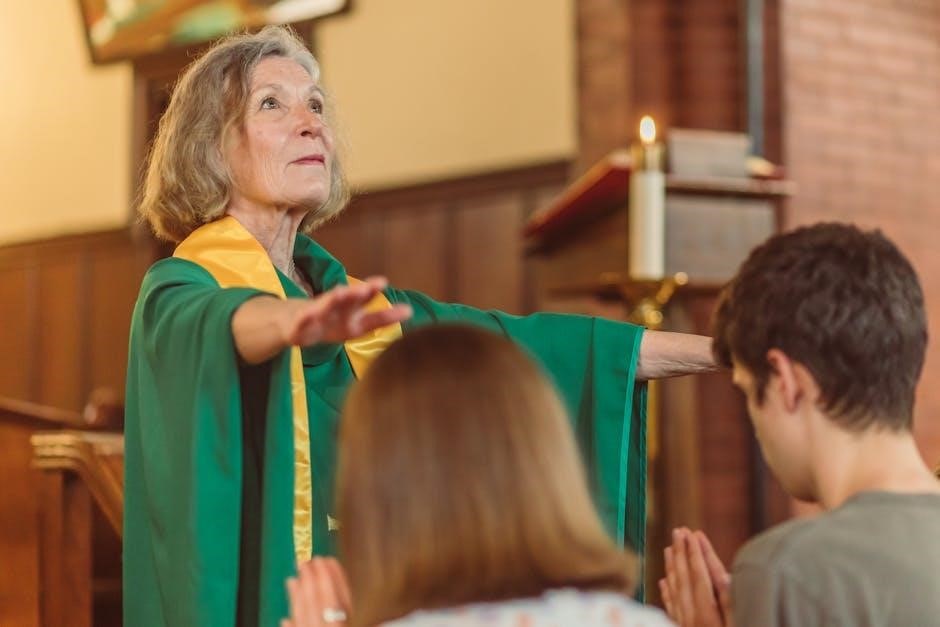
Historical and Biblical Background
Church elders trace their roots to the New Testament‚ where they were appointed to lead local churches‚ as seen in Acts and Paul’s epistles. Their role emphasizes maintaining doctrine‚ order‚ and spiritual guidance‚ reflecting biblical teachings and early church practices.
The New Testament Model of Eldership
The New Testament establishes elders as spiritual leaders‚ guiding local churches with wisdom and integrity. In Acts 15‚ apostles and elders collaboratively addressed theological issues‚ while Paul’s epistles emphasize their role in teaching‚ correcting‚ and overseeing congregations. This collective leadership model ensures decisions are made prayerfully‚ reflecting a shared commitment to doctrine and community well-being‚ as seen in Titus 1 and 1 Timothy 3‚ which outline qualifications for eldership.
The Role of Elders in the Early Church
In the early church‚ elders played a pivotal role in spiritual and practical leadership. They worked alongside apostles and deacons‚ addressing theological disputes and guiding congregations. As seen in Acts 15‚ elders collaborated in decision-making‚ ensuring unity and doctrinal integrity. Their responsibilities included teaching‚ correcting‚ and overseeing the flock‚ protecting them from false teachings. This model‚ rooted in biblical principles‚ emphasized the importance of collective leadership and accountability‚ fostering a vibrant‚ God-centered community.
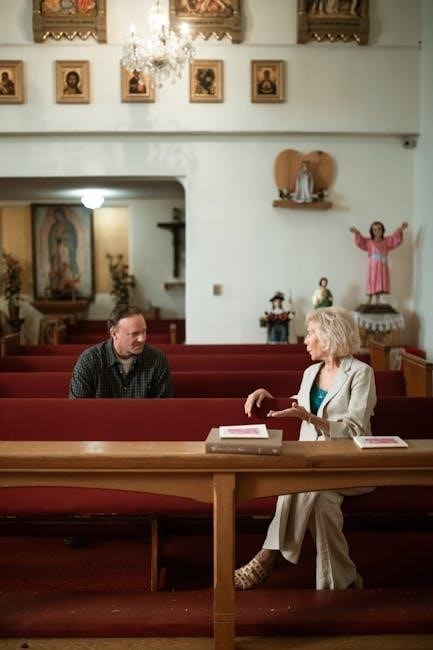
Qualifications and Responsibilities
Elders must meet biblical qualifications‚ such as being blameless and able to teach‚ overseeing the church with integrity‚ providing spiritual guidance and practical leadership.
Biblical Qualifications for Elders
Elders must meet specific biblical standards‚ such as being blameless‚ the husband of one wife‚ temperate‚ and hospitable. They should be able to teach‚ not given to wine‚ and self-controlled. A good reputation‚ both within and outside the church‚ is essential. These qualifications ensure elders can lead with integrity‚ providing spiritual guidance and maintaining order in the congregation‚ as outlined in 1 Timothy and Titus.
Responsibilities of Elders in Church Governance
Elders are responsible for overseeing church operations‚ ensuring decisions align with biblical teachings. They lead in collective decision-making‚ guiding the congregation in matters of doctrine and practice. Elders also manage administrative tasks‚ such as resource allocation and maintaining order. Their role includes resolving conflicts and providing spiritual oversight‚ ensuring harmony within the church. By working alongside deacons and other leaders‚ elders help create an environment where the church can thrive and fulfill its mission effectively.
The Role of Elders in Church Governance
Elders provide spiritual and organizational leadership‚ ensuring decisions align with biblical principles. They work collaboratively with the church‚ fostering unity and accountability in governance.
Collective Decision-Making in the Church
Elders collaborate with the church body in decision-making‚ ensuring unity and accountability. This collective approach prevents authoritarian rule and fosters transparency. Decisions are made jointly‚ with elders providing guidance while the congregation participates actively. This model reflects the biblical principle of shared responsibility‚ ensuring that the church remains a cohesive and Spirit-led community. Deacons often assist in practical matters‚ allowing elders to focus on spiritual oversight and doctrinal integrity.
Elders’ Involvement in Church Administration
Elders play a crucial role in church administration‚ overseeing financial management‚ property maintenance‚ and organizational planning. They ensure resources are used wisely to support ministries and community outreach. By handling administrative tasks‚ elders enable pastors and deacons to focus on spiritual and service-oriented responsibilities. This structured approach ensures the church operates efficiently‚ aligning its efforts with biblical principles and fostering a healthy‚ thriving congregation.
Spiritual Oversight and Teaching
Elders provide spiritual guidance‚ teaching doctrine‚ and protecting the flock from false teachings. They ensure the church remains grounded in biblical truths‚ feeding the flock and maintaining doctrinal purity.
The Importance of Elders in Spiritual Guidance
Elders play a crucial role in providing spiritual guidance to the congregation. They ensure that teachings align with biblical truths‚ offering wisdom and direction to believers. By modeling Christ-like behavior‚ elders foster a community rooted in faith and integrity. Their leadership helps members navigate life’s challenges‚ strengthening their relationship with God. Effective spiritual guidance from elders promotes unity and maturity within the church‚ essential for fulfilling its divine purpose.
Elders as Teachers and Protectors of Doctrine
Elders are entrusted with teaching and safeguarding biblical doctrine‚ ensuring the church remains grounded in truth. They must be able to instruct others and correct false teachings‚ protecting the flock from spiritual error. Like the apostles‚ they feed the congregation with sound doctrine‚ preserving the integrity of God’s Word. This role is vital for maintaining unity and preventing the spread of harmful ideologies within the church‚ fulfilling their divine mandate as guardians of truth.
Elders in Church Leadership
Elders provide spiritual oversight and guidance‚ working alongside deacons and other officers to ensure the church functions effectively. Their leadership fosters unity and promotes biblical principles.
Working Alongside Deacons and Other Church Officers
Elders collaborate with deacons and other church officers to ensure balanced ministry. While elders focus on spiritual oversight and teaching‚ deacons manage practical needs‚ fostering harmony and effective church operation. This partnership reflects the New Testament model‚ where distinct roles complement each other to serve the congregation comprehensively.

Practical Aspects of Eldership
Eldership involves practical responsibilities such as mentoring‚ decision-making‚ and community engagement. Training programs and support systems are essential to equip elders for effective ministry and leadership.
Training and Equipping Elders for Ministry
Training and equipping elders for ministry involves comprehensive programs focused on biblical knowledge‚ leadership skills‚ and practical application. Elders must be well-versed in Scripture to teach and guide effectively. Churches often provide resources‚ mentorship‚ and workshops to enhance their abilities. Spiritual development‚ such as deepening prayer life and integrity‚ is also emphasized. By fostering growth and accountability‚ elders are prepared to serve as humble‚ wise‚ and compassionate leaders within their congregations‚ ensuring the church remains grounded in biblical principles and practices.
Support Systems for Elders in Their Role
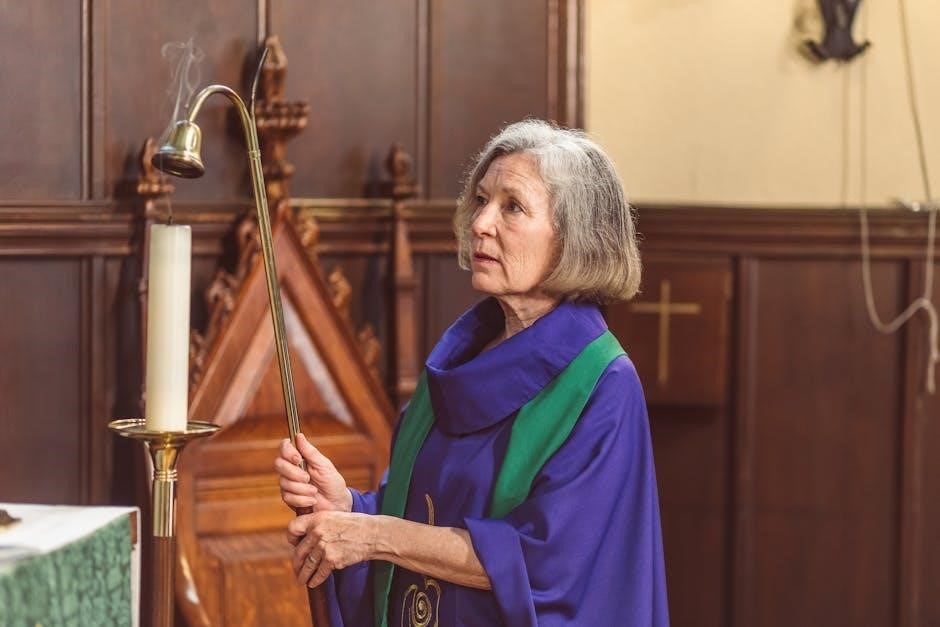
Effective support systems for elders are essential to ensure they thrive in their ministry. Churches often provide resources‚ such as training programs and mentorship‚ to strengthen their leadership abilities. Mutual respect and accountability within the congregation foster a supportive environment. Elders also benefit from collaboration with other church leaders and open communication with the congregation. These systems help elders maintain their spiritual and emotional well-being‚ enabling them to serve with integrity and effectiveness‚ ultimately enriching the church community.
The Relationship Between Elders and the Congregation
The relationship between elders and the congregation is rooted in mutual respect‚ accountability‚ and open communication‚ fostering trust‚ unity‚ and spiritual growth through collaborative ministry.
Mutual Respect and Accountability
Mutual respect and accountability form the foundation of a healthy relationship between elders and the congregation. Elders are to be respected for their spiritual oversight and integrity‚ while the congregation holds them accountable for faithfully fulfilling their duties. This dynamic fosters trust and collaboration‚ ensuring that elders lead with humility and the church supports their ministry. Accountability also extends to the congregation‚ as members are encouraged to honor and pray for their leaders. This mutual respect promotes a harmonious and edifying church environment‚ aligning with the New Testament model of eldership.
Communication and Collaboration
Effective communication and collaboration are essential between elders and the congregation. Elders must maintain open dialogue‚ listening to the needs and concerns of the church while sharing vision and guidance. Collaboration ensures unity and alignment in ministry efforts‚ fostering a sense of teamwork. This mutual exchange prevents misunderstandings and strengthens trust‚ allowing the church to function harmoniously. Elders model Christ-like communication‚ promoting transparency and humility‚ which cultivates a culture of trust and shared responsibility within the church.
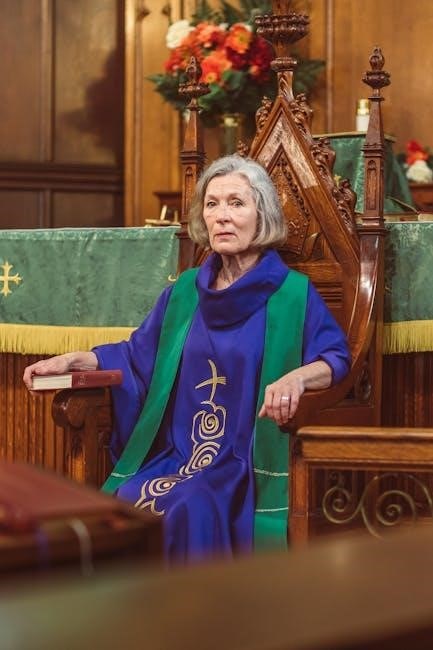
Case Studies and Examples
Historical and modern examples of effective eldership highlight the New Testament model‚ demonstrating how elders have guided churches through challenges‚ inspiring faithfulness and integrity in leadership and ministry.
Historical Examples of Effective Eldership
The New Testament provides a clear model of eldership‚ as seen in the early church. Elders like Paul and Peter exemplified spiritual leadership through teaching‚ prayer‚ and oversight. The Jerusalem Council in Acts 15 demonstrates elders collaborating to resolve conflicts and maintain doctrinal purity. Historical examples show elders navigating challenges while upholding biblical principles‚ ensuring the church remained unified and faithful. Their roles in guiding congregations and protecting doctrine highlight the enduring importance of effective eldership in church history.
Modern Applications of Biblical Eldership
Modern churches apply biblical eldership by maintaining spiritual oversight‚ fostering unity‚ and equipping believers for ministry. Elders today prioritize prayer‚ teaching‚ and disciple-making‚ mirroring New Testament practices. Training programs and collaborative leadership ensure elders are well-equipped to address contemporary challenges. Technology and cultural sensitivity are integrated while preserving biblical integrity. Effective modern eldership balances tradition with innovation‚ ensuring the church remains a vibrant‚ transformative community focused on spiritual growth and mission; This approach honors the biblical model while addressing today’s unique demands.
Church elders play a vital role in guiding and nurturing congregations‚ balancing biblical principles with modern challenges. Their leadership ensures spiritual growth and fosters a united‚ purpose-driven church community.
The Importance of Elders in the Life of the Church
Elders are vital for maintaining spiritual health and unity within the church. They provide guidance‚ teach doctrine‚ and protect the flock from false teachings. By working alongside deacons and other leaders‚ elders ensure balanced governance and practical support for the congregation. Their role fosters mutual respect and accountability‚ creating an environment where believers can grow in faith. Effective eldership is essential for a thriving church‚ as it upholds biblical principles and promotes a harmonious‚ purpose-driven community.